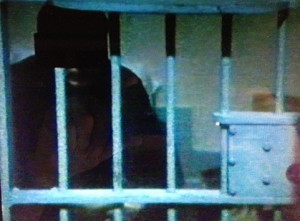Imprisoned police officers live in dread, in isolation
 It is unlikely, if history is a guide, that Constable James Forcillo (inset), the Toronto police officer charged in a fatal streetcar shooting, will be convicted and sent to prison. No Toronto officer has ever been convicted of murder in an on-duty killing, according to the Toronto Star. But, if Forcillo were convicted, what would life be like in prison? It would be a hellish experience in which he’d be forced to live in protective custody, segregated from other prisoners, mindful always that fellow convicts would be plotting to kill him. A bounty might be placed on his head and the fellow con who succeeded in killing him would be regarded by other inmates as a hero. “To be a police officer in prison is very difficult,” former Niagara Region officer Lawrence Squire said in feeble voice, speaking to a documentary film crew from his solitary confinement cell at maximum-security Kingston Penitentiary, where he had been confined after his conviction for non-capital murder more than 30 years ago.
It is unlikely, if history is a guide, that Constable James Forcillo (inset), the Toronto police officer charged in a fatal streetcar shooting, will be convicted and sent to prison. No Toronto officer has ever been convicted of murder in an on-duty killing, according to the Toronto Star. But, if Forcillo were convicted, what would life be like in prison? It would be a hellish experience in which he’d be forced to live in protective custody, segregated from other prisoners, mindful always that fellow convicts would be plotting to kill him. A bounty might be placed on his head and the fellow con who succeeded in killing him would be regarded by other inmates as a hero. “To be a police officer in prison is very difficult,” former Niagara Region officer Lawrence Squire said in feeble voice, speaking to a documentary film crew from his solitary confinement cell at maximum-security Kingston Penitentiary, where he had been confined after his conviction for non-capital murder more than 30 years ago.

Imprisoned former police officer, Lawrence Squire interviewed through the bars of his solitary confinement cell at Kingston Pen in 1978 by the makers of the NFB documentary A Warehouse for Bodies
Forcillo was charged today with second-degree murder in the shooting death of 18-year-old Sammy Yatim in a Toronto streetcar. Squire was convicted in the 1973 shooting of 19-year-old man, Norman Tremblay. Squire was off duty, drinking during a pub crawl with fellow officers when the fatal shots were fired. An investigative expose by the Toronto Star, published in 1977, later raised doubt about whether Squire had been drugged and was impaired by a combination of a substances and alcohol at the time. Imprisoned former police officers hold a particularly low position in the social strata of prison life. They are despised by other convicts because they represent the ’system,’ the criminal justice process that has imprisoned stand-up crooks. When an officer arrives at a penitentiary, he is marked for death by fellow prisoners and he must be kept in protective custody. To their credit, Corrections Canada has done a remarkably consistent job of keeping imprisoned ex-officers alive. A National Film Board of Canada documentary crew secured extraordinary access to Kingston Pen in 1978 for the documentary that featured Squire, though his identity was crudely concealed by an electronic black mask that covered his eyes. His last name was not revealed. In an interview from behind his solitary cell door, Squire was asked about life inside Kingston Pen.
Here’s what he told the National Film Board in its revealing documentary, A Warehouse for Bodies, in 1978:
“I’ve been in prison 50 months now for a crime I’m not guilty of. I’m still trying to fight my case. It’s been a long fight and very difficult one. I was not given a fair trial and uh, this can be easily proven.”
Interviewer: “Why are you in solitary confinement?”
“Well (clears throat), I’m an ex police officer and I was a police officer when this happened and uh, I’ve been in prison now for 50 months and out of that 50 months I’ve spent 28 months in solitary. To be a police officer in prison is ah, (clears throat) very difficult and uh, the inmates, when they found out, they will not allow a police officer to be in their midst, they ah, they feel that it is some type of, ah, well, going by their code, it’s something that they don’t allow, and it’s something that they don’t feel safe with and I’ve had attempts on my life, I’ve had so many things happen to me that solitary is the only thing that the prison authorities had left, at least under the present conditions anyways.”
Interviewer: “Lawrence, what’s your opinion of the penitentiary system, now that you’re on the other side of it?”
“Well, when I was working as a police officer I had no idea that, had no idea of the prison system, what it was, what it was supposed to be doing. I was under the impression that it was trying to help me, trying to get people back into a new lifestyle, but my experience since I’ve been in is that prisons are simply warehouses, simply places to lock somebody up for so much time and then release them.”
After Squire’s first conviction, he won an appeal at the Ontario Court of Appeal but that was reversed by the Supreme Court of Canada. Other police officers have gone to prison and lived to tell about their experiences. Former RCMP officer Patrick Kelly was imprisoned for killing his wife. His life inside is vividly documented in Michael Harris’ excellent book, The Judas Kiss. Former Toronto police officer Rick Wills was convicted in 2007 of murdering his mistress. He’s still alive behind bars.
Here’s the full text of the second news release regarding the arrest of Constable Forcillo issued today by Ontario’s Special Investigations Unit, the body that probes incidents involving police that involve serious injury or death:
Update on Arrest of Toronto Police Service Constable James ForcilloCase Number: 13-TFD-181
Other News Releases Related to Case 13-TFD-181
Mississauga (19 August, 2013) — Arrangements have been made through Constable James Forcillo’s lawyer, Peter Brauti, for his client to surrender himself into the custody of the Special Investigations Unit (SIU) tomorrow morning, Tuesday, August 20, 2013. Cst Forcillo will be transported to the Old City Hall and make an appearance before a Justice of the Peace shortly after the arrest. Pursuant to the provisions of the Criminal Code, he will be detained in custody. The Criminal Code allows an accused to have the detention order reviewed in Superior Court and seek bail at any point in time.Because Cst Forcillo has been the recipient of threats, we are not disclosing the location of the arrest.
Earlier today, SIU Director Ian Scott caused a charge of Second Degree Murder contrary to s. 235(1) of the Criminal Code to be laid against the officer in relation to the shooting death of 18-year-old Sammy Adib Yatim. The incident took place on a TTC streetcar around midnight on July 26-27, 2013.
The SIU is an arm’s length agency that investigates reports involving police where there has been death, serious injury or allegations of sexual assault. Under the Police Services Act, the Director of the SIU must
consider whether an officer has committed a criminal offence in connection with the incident under investigation
depending on the evidence, lay a criminal charge against the officer if appropriate or close the file without any charges being laid
report the results of any investigations to the Attorney General.Monica Hudon
SIU Communications/Service des communications, UES
Telephone/No de téléphone: 416-622-2342 or/ou 1-800-787-8529 extension 2342
A conviction for second-degree murder carries an automatic sentence of life in prison with no chance of parole for 10 to 25 years. The parole eligibility is set by the trial judge, after taking a recommendation from the jury, if the case is tried by jury and if the jurors choose to make a recommendation.
Here’s one of the bystander videos that captured the shooting of Yatim by Forcillo:
Cancrime
- Rob Tripp's profile
- 8 followers




